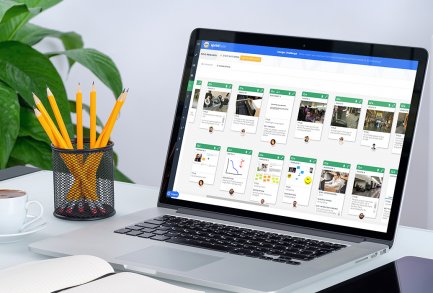Great icebreakers: How to kick off a virtual workshop
Whatever kind of design thinking workshop you’re running – whether in-person or virtual – it’s so important to take a few moments before you kick off to get your participants warmed up, comfortable with one another, and engaged.
But when you’re working virtually, it’s even more important that you do all you can to break down barriers between people who don’t just have screens but potentially oceans between them.
Icebreakers play a vital role here. So to help you build a connection between participants at your next virtual workshop, we’ve shared five of our favourite warm-up activities. You can also find suggestions for ways to inject some energy midway through a session below, too.
1. Reframing the question
This exercise is a great way to help participants start thinking about the value of asking questions in a different way – a key lesson you want them to take from a design thinking workshop.
How to do it:
Ask everybody to grab a post-it note and draw a vase.
Generally, these will all come out looking broadly the same.
Then put everybody into virtual breakout rooms with one other person/in small groups and tell them to ask each other questions – about what they care about, what their home looks like, who they live with, whether they have children etc.
Then bring everybody back together and ask them to design a way to display flowers in the home of the person they’ve just spoken to, taking what they’ve learnt about them into account.
This should result in very different, much more considered and personalised drawings.
The exercise shows the group that when we understand who we’re designing something for, we’re much better equipped to meet their needs. We’re no longer just talking about a vase, we’re talking about displaying flowers for a specific person. It takes us away from the product and helps us focus on the person it’s for.
You could also do this by asking people to bring toilet rolls, tape, clay or other art bits and pieces they have in their house and getting them to build the item.
2. Guess my favourite…
This exercise is great for helping people get to know each other and the Sprintbase platform.
How to do it:
Pick a category from which everybody can pick their favourite – for example, it could be their favourite album, film, book – whatever you like, but make it broad so everybody will find it easy to participate. Or, as an alternative, you could ask people to share the first album they owned or film they saw at the cinema.
Ask everybody to come ready with a picture of their item, and then give them a couple of minutes to upload it as a whiteboard note.
Get everybody to say a little bit about themselves – whether in breakout rooms if it’s a big group or altogether if it’s a smaller group – and then ask everyone to use dots or post-it notes to mark which item they think was chosen by each person.
Then bring everybody back together and reveal the answers.
This is a great way to get people chatting and comfortable using the platform.
3. Where do you have your best ideas?
This exercise is all about teaching people about creative thinking and what it means to see something through somebody else’s eyes. It also helps them get to know each other.
How to do it:
Ask everybody to think about where they have their best ideas – this could be anywhere, in the shower, in the car, whilst out for a run etc.
Then put people into virtual breakout rooms and ask them to discuss their answers and draw somebody else’s response.
Bring everybody back together and explain that they’ve just done everything this workshop is about – stepping into somebody else’s shoes, and seeing the world from their perspective.
4. What’s your dream job?
This one’s a fun way to get people talking about themselves, listening to one another, and using the Sprintbase platform.
How to do it:
Ask everyone to, using a whiteboard note, describe their dream job. They can use words, pictures, sketches, whatever they like.
Then, either in small groups or all together, ask each person to show theirs and describe why it would be their ideal job.
5. Pen portraits
This is a guaranteed way to build a connection between participants and get them laughing, too.
How to do it:
Get everybody to work in pairs or small groups and ask them to have a chat and draw a quick sketch of one another.
Then bring everybody back together and ask people to show their drawings and say a bit about them.
This will help people relax with one another, have some fun, and you might even uncover the hidden artist in the group, too.
And don’t forget…
It’s so important to kick off a workshop on a high, but don’t forget to throw some short, sharp exercises into the session to keep everybody energized as you go.
There probably won’t be time for these during a short workshop that’s just a couple of hours long (but you can see our tips for keeping everybody engaged in a short session here). But they’re key for longer workshops. Here are some activities we find effective:
Quick responses
- Post a picture on screen and ask people to react to it with just one word – either verbally or on a whiteboard note.
- Or use polling questions to ask people how they felt about the last exercise. This is a great way to make sure everybody is engaging as you can see how many people vote.
Short, sharp team working competitions
People working at home are surrounded by all sorts of everyday objects – from crockery and cutlery to books and stationery.
Set a timer for three minutes and tell everybody that they have to go and get as many of a particular item as they can – e.g. forks, things that are blue, pens etc.
Or, alternatively, tell each team that between them they need to gather together items that make up the colours of the rainbow. This makes for a bit of fun teamwork, as they have to work out quickly who will be responsible for each colour, and then collect them.
Then bring everybody back together and see how many groups managed it.
Find out how you can facilitate more engaging and productive workshops on Sprintbase
More from the blog

8 cool things you can do on Sprintbase
We love using your feedback to make your journey better, and to help you achieve even more amazing results.

Better Brainstorming
Time and time again, we’re expected to pluck ideas out of thin air. And not just any idea, but innovative sparks of inspiration destined to kick ass and impress the C-suite.

Building Sprintbase: 4 mistakes we made and what we learned
There are a huge number of good decisions that inform a business going where you want it to go. But, along the way, there are always going to be a fair number of mistakes that…
Get a free trial
Contact us to get your free trial or to talk about how Sprintbase can help you achieve your remote innovation goals.
Get started





